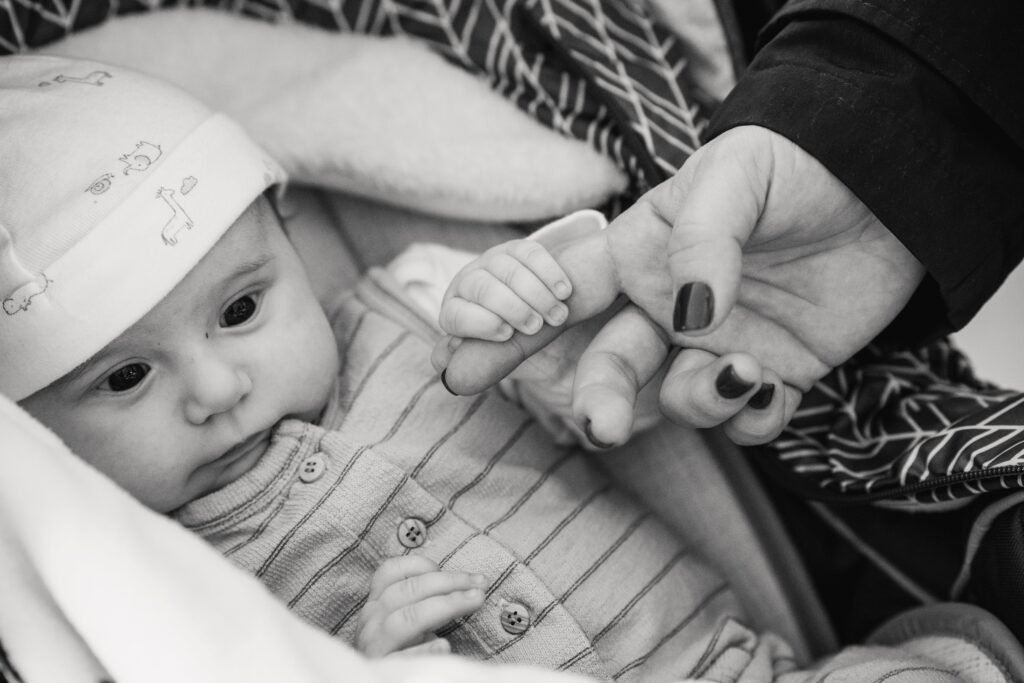If you’ve ever held a baby, you’ve likely had the experience of tiny hands reaching up to grab at your face. This instinctual behavior often takes parents by surprise, leaving them wondering why babies are so fascinated with touching faces. As it turns out, there are some solid reasons behind this common baby milestone.
Exploring Through Touch
For babies, touching things is one of the main ways they learn about the world around them. A baby’s vision is still quite blurry during the first few months of life, so they rely heavily on physical touch to gather information. Reaching out to grasp a nearby face allows them to explore features like noses, cheeks, chins, and mouths through texture and shape. Face-touching satisfies a baby’s innate curiosity and helps their learning development.
Connecting Through Communication
Touching or stroking faces is also one of the earliest forms of communication between babies and caregivers. Since babies cannot yet speak, facial touch serves an important social signaling function. By making physical contact with a caregiver’s face, the baby is initiating a type of pre-verbal dialogue and bonding. The caregiver usually responds with nuzzled touches, loving eye contact, and affectionate words. This back-and-forth exchange helps strengthen the attachment relationship between baby and caregiver during the first critical months.
Mirror Neuron Activation
Some researchers also believe that face touching triggers so-called “mirror neurons” in an infant’s developing brain. Mirror neurons are specialized cells that fire when we observe someone else carry out an action. This neural circuitry helps humans learn through mimicry and helps us empathize. A baby who watches mom smile or dad stick out his tongue has mirror neurons that spark and kindle, essentially “copying” these facial gestures internally. When reaching out to manually touch the faces they see so frequently, babies may be kicking their budding mirror neuron systems into gear; it’s almost like a rehearsal as their brains practice making different facial expressions.
Developing Hand-Eye Coordination
On a more functional level, practicing face-to-face touching also helps babies improve their hand-eye coordination. In the early months, babies have limited control and precision in their arm and hand movements. Successfully directing their hands toward a caregiver’s nearby face and making tactile contact with the eyes, nose, or mouth requires focus and skill. With time and repetition, reaching gets easier and helps babies sharpen their small motor skills. Mastering this ability soon translates into improved dexterity when grasping toys, teether rings, and other objects.
Seeking Comfort and Security
Lastly, for some babies, touching their caregivers’ faces is a source of real comfort and security. Young infants experience separation anxiety whenever mom or dad leaves the room. Placing a gentle hand against the warm cheek of a nearby caregiver after resuming close proximity helps to physically reconnect. The baby is signaling their relief at no longer being separated from their trusted companion and source of food, warmth and nurturing affection. Making face contact is almost like plugging back into a trusted emotional charger after feeling temporarily abandoned. The baby’s soft facial strokes communicate their comfort with their closest bonds.
In summary, babies touch faces for several interconnected reasons all relating to bonding, communication, exploration, skill building and comfort-seeking. It’s one of the earliest and most universal behaviors seen between almost all infants and caregivers. Pay attention next time your baby wraps their tiny hand around your finger or pats your mouth or nose – it reflects their innate relationship-building wiring hard at work! Tracking when your baby first starts attempting to touch faces can also serve as an exciting milestone to highlight in their baby book.
![Picture of Abhishek Sonkar [ Author ]](https://kidzoot.com/wp-content/uploads/2023/07/Front-photo-for-Website-300x300.webp)
Abhishek Sonkar [ Author ]
Meet Abhishek Sonkar, [B.com, B.Ed., M.Ed.], a child development specialist with years of experience in the field. He has written numerous blog posts on child development and parenting.
FOR MORE VALUABLE TIPS BUY OUR PARENTING COURSES https://www.kidzoot.com/courses/
CONSULT YOUR PERSONAL PARENTING SOLUTIONS VIA APPOINTINTMENT AT https://www.kidzoot.com/appointment-booking/
Follow Us on Twitter www.twitter.com/kidzootworld

